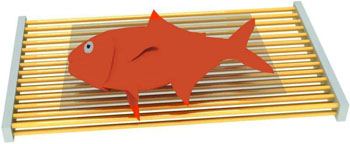Metasurface Grid Boosts Sensitivity of MRI Machines
By MedImaging International staff writers
Posted on 24 Jan 2016
A new study claims that ultrathin metasurface resonators could reduce magnetic resonance imaging (MRI) scanning times by more than 50%.Posted on 24 Jan 2016
Researchers at ITMO University (St. Petersburg, Russia), Australian National University (ANU; Canberra), and other institutions demonstrated that when a specially designed metasurface (formed by an array of metallic wires) is placed under an object inside a MRI scanner, a substantial enhancement of the radio¬frequency (RF) magnetic field is achieved by means of subwavelength manipulation with the metasurface, increasing the signal-to-noise ratio in the scanned area.

Image: An artist\'s view of a biological object placed on a metasurface resonator (Photo courtesy of Advanced Materials).
The result of this increase is that either a higher resolution image can be obtained over the same time slot, or that a faster examination can be performed with the same resolution as in an ordinary MRI scanner. In addition, the metasurface suppresses the electric field responsible for tissue heating, a phenomenon has recently become even more relevant with the arrival of high-field and ultra-high-field MRI scanners that provide better image resolution, but also cause an increase in RF energy absorption. The study describing the technology was published on January 11, 2016, in Advanced Materials.
“In the future we see even more potential in the concept of special smart clothing for MRI scanning; stripes of our metamaterial can be sewn in the clothes,” said lead author Alexey Slobozhanyuk, a PhD student from ITMO University at ANU. “The examination of patients, wearing such clothes, would lead to higher resolution MRI images, while the special design will enable a homogeneous enhancement of the signal-to-noise ratio, which does not pose any risk to the patients' health.”
The metasurface solution does not require any intervention in the hardware of the MRI scanner, but rather represents an inexpensive functional add-on device that can be used with any existing MRI scanner. The patent-pending technology is currently being co-developed by MediWise (London, United Kingdom), a company that specializes in commercializing metamaterials for medical applications.
“Metamaterials have been proven to add value through their ability to process electromagnetic and sound waves in ways that no natural material can do,” said George Palikaras, Founder and CEO of Mediwise. “The technology has the potential to extend the life of MRI imaging machines but more importantly, it will make the scan quicker, more accurate and safer to patients. We are honored to work alongside world leading academic partners, and to help advance this important innovation from the laboratory to the marketplace.”
Related Links:
ITMO University
Australian National University
MediWise









 Guided Devices.jpg)



